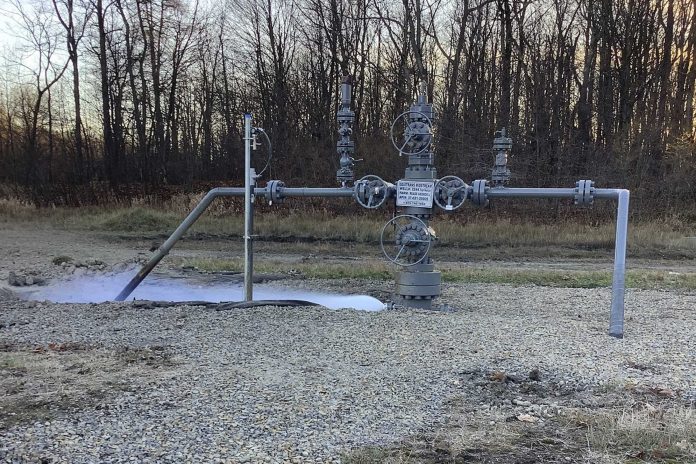
By MICHAEL BIESECKER
Associated Press
The operator of a natural gas storage well in Western Pennsylvania says workers have successfully plugged a leak that had been spewing massive amounts of planet-warming methane into the atmosphere for two weeks.
Equitrans Midstream said the well at its Rager Mountain storage facility, located in a rural area about 1.5 hours east of Pittsburgh, was sealed shut with concrete on Sunday. The well had been venting about 100 million cubic feet of natural gas per day since Nov. 6, according to initial estimates.
If accurate, that would total more than 1.4 billion cubic feet in methane, equal to the greenhouse gas emissions from burning more than 7,200 tanker trucks of gasoline.
Pennsylvania environmental regulators have issued the company notice of five potential violations of state law.
A written statement provided Sunday by Equitrans says the company had verified a 0% gas reading at and around the well. More than 250 feet of cement was pumped into the wellbore above two plugs to ensure venting does not recur, the company said.
The Rager facility is in Jackson Township, at the heart of the Marcellus Shale formation that has seen a boom in gas production since the introduction of hydraulic fracturing more than a decade ago. Residents living as four miles away from the leak told The Associated Press on Friday they could hear the roar of pressurized gas escaping from the well and smell the fumes.
Methane, the primary component of natural gas, is colorless and odorless. But when the gas is processed for transport and sale, producers add a chemical called mercaptan to give it a distinctive “rotten egg” smell that helps make people aware of leaks.
Methane’s Earth-warming power is some 83 times stronger over 20 years than the carbon dioxide that comes from car tailpipes and power plant smokestacks. Oil and gas companies are the top industrial emitters of methane, which, once released into the atmosphere, will be disrupting the climate for decades, contributing to more heat waves, hurricanes, wildfires and floods.
The leak came as the Environmental Protection Agency on Nov. 11 updated proposed new rules intended to cut methane and other harmful emissions from oil and gas operations.
The citations issued against the company by the Pennsylvania Department of Environmental Protection include failures to properly maintain and operate the gas facility, creating a public nuisance and producing a “hazard to public health a safety.” The company was also cited for failing to provide state inspectors “free and unrestricted access.”q


















